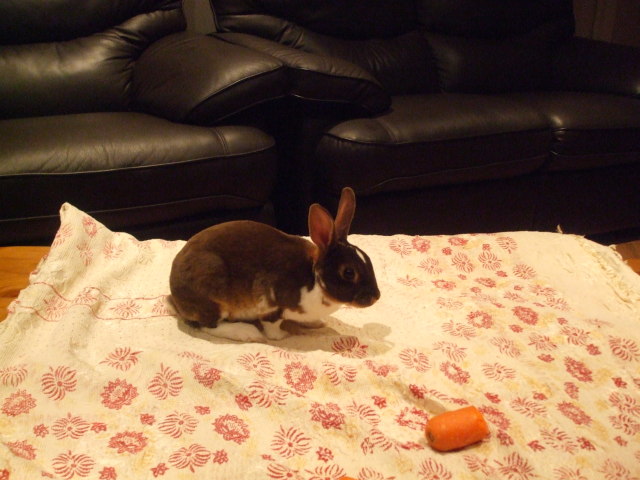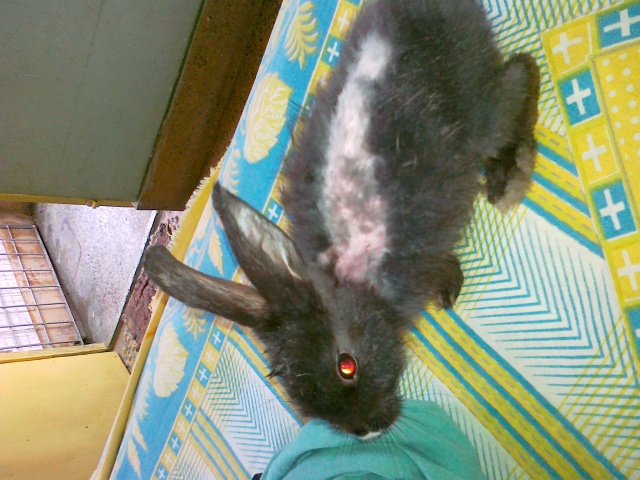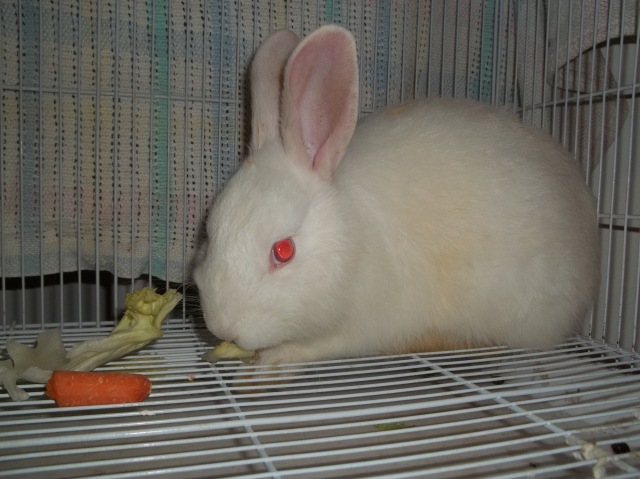QuestionWatership Down is one of my all time favorite books, particularly because the rabbits in Europe live together in warrens. Wild rabbits here in America are solitary and are defensive of any other wild rabbit that comes into their home range. This is just hypothetical, but if a few complete warrens with all the individual rabbits in them were captured and were released together here in America, in an environment that resembled the one they came from, would they survive here by continuing their warren constructions,or would they switch to become solitary like out cottontails?
AnswerDear Nathan,
It's not even hypothetical. There are numerous warrens of feral rabbits around the U.S. in various places. As long as the rabbits have a chance to dig a warren as a safe refuge, they do set up shop just like their wild counterparts in Europe. Like them, they remain social, and act pretty much the way you would expect them to in Watership Down. Our domestic rabbits *are* European rabbits (Oryctolagus cuniculus), and though they have been selecte for different shapes, colors and sizes, they are not very different from their wild counterparts in temperament, psyche, and personality.
We have a mini-warren of nine Oryctolagus cuniculus rescued from behind a shopping mall, where they had been dumped because they all had severe cases of mange and were all very sick. We nursed them back to health, and now they live with us, part time inside, part time out. Outside, they have dug a magnificent warren. They are a family group, with a matriarch who's the alpha, another large female who might be her sister, and then the other seven who are their various offspring. We named the smallest one Hlao-roo ("Roo" for short). They are intelligent, complex, and have interesting social interactions. They live in harmony and are great fun. And, as you might expect from their genetic heritage, they remain social. Domestic rabbits thrive on social interaction, and we never adopt out a single bunny: everyone has to have at least one pal (trios are best). We're hoping we can find a loving home who will take all nine of these beautiful bunnies and give them the best possible place they can live safely, as a warren.
So if you have a fenced, predator-proofed yard and would like to have your very own Watership Down, I know just the bunnies for you. :)
We also live with rescued jackrabbits and cottontails who reside in the predator-proofed back yard. Contrary to popular belief, they are not solitary. The hares like to congregate and hang out together, and some have formed solid social bonds with each other. They definitely have favorite friends, and I have seen hares grieve terribly when one of their best friends simply doesn't respond to our careful medical treatments, and passes on.
The cottontails, too, are social, though far more combative and similar to the domestics (Oryctolagus cuniculus) in nature and personality than the gentle hares, who never fight with anything more than their paws. The cotties, too, form "posses" of favorites, and there are definite likes and dislikes, no matter what the sex.
We have a single Sylvilagus palustris ("Teddy") male who has taken up residence and considers himself the alpha of a small group of S. floridianus, who follow him around and all snooze together in one area under his "protection". He will ferociously chase any domestic rabbit or cottontail he considers a foreigner! He's less than a kilogram, but he seems to have no idea he's that small. Yesterday, he chased our gigantic English Lop, Emma, who is seven times his size, back into the house when he felt she had encroached on his turf. He's a tiger!
I feel very privileged to be able to live with these amazing, fascinating, intelligent creatures who have taught me so much! Let me know if you have any other questions about them.
Dana

 About how old is she?
Question
Thumper Dumper
Hello, I have a Female Mini Rex
About how old is she?
Question
Thumper Dumper
Hello, I have a Female Mini Rex
 excessive drool and teeth are fine
Question
bunbun
I have a mini rex approx. 5yrs.
excessive drool and teeth are fine
Question
bunbun
I have a mini rex approx. 5yrs.
 Colour breeding
Questionmini rex buck
QUESTION: We have a very s
Colour breeding
Questionmini rex buck
QUESTION: We have a very s
 Is my rabbit sheding or has some other problem?
Questionbald rabbit
QUESTION: I am Indrani from
Is my rabbit sheding or has some other problem?
Questionbald rabbit
QUESTION: I am Indrani from
 Our new albino rabbit...
Question
Snowball
I just bought my daughter our first r
Our new albino rabbit...
Question
Snowball
I just bought my daughter our first r